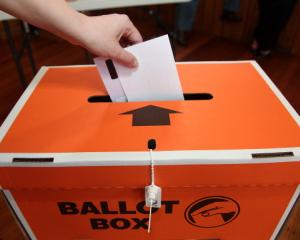
The move prompted Dunedin Mayor Aaron Hawkins to apologise to an agency staff member for the "unsolicited correspondence to your CEO".
A councillor sympathetic to the views of the dissenting councillors did not sign their letter, because he said it was an appalling misuse of process, undermining a democratic decision.

The other five councillors behind the letter were Carmen Houlahan, Andrew Whiley, Lee Vandervis, Rachel Elder and Doug Hall.
Crs Vandervis and Hall were not present for the vote, which the minority bloc lost 5-7.
The six councillors said they wanted to "bring some balance" and they argued for a programme of works that included retaining the SH1 pair of one-way routes, which was also what the Waka Kotahi board favoured.
Safety was one reason cited.
"Doubling the number of trucks on a road through the heart of our student area as well as converting it to two-way traffic is also a recipe for calamity," the councillors said.
Liveability was another reason.
"Excessive congestion drives frustration, disillusionment and even anger," they said.
Waka Kotahi is expected to make a final call about one-way or two-way traffic in the first quarter of 2023.
The correspondence from February this year was released this week under the Official Information Act.
Cr Radich, a mayoralty candidate, said yesterday the council had acted against the will of the people, who clearly wanted the one-way system to stay.
Mr Hawkins said everybody on the council lost votes from time to time.
"That’s the nature of democracy, and we need to accept it.
"This was an extraordinary response, and a clear abuse of process, trying to undermine the will of council rather than accept it," Mr Hawkins said.
One councillor who voted against the council’s push for consideration of the two-way model was Mike Lord, but he did not sign the group’s letter.
Cr Lord said the council made a decision that was different from how he voted, and he accepted that.
He felt undermining a council decision would have been wrong.
In his letter, Mr Hawkins commented the programme of works should be the catalyst for a more future-focused transport network.
A two-way model had the support of the University of Otago and the Southern District Health Board and he pointed to a health impact assessment that stated it offered substantially more for health and wellbeing outcomes.
Mr Hawkins also highlighted zero carbon aspirations.
He said yesterday the status quo was not on the table and construction of the new Dunedin hospital in the city centre was the catalyst for work on the transport network.
"Waka Kotahi’s two proposals would both change the function of the road, including reviewing the speed limit," he said.
"We should be brave enough to consider how our streets can best contribute to our community’s health and wellbeing."
An enhanced pedestrian environment was one advantage identified for a two-way model.
The group’s letter signalled some doubt that many people would walk or cycle to work.
"Unfortunately, weather variability is a significant disincentive to work-related active transport in Dunedin."












